-
-
- Council Members
- Role of Council Members
- Council meetings
- Council elections
- Previous election results
- Dr Louise Allum
- Dr Sam Bescoby
- Dr Andrew Clemence
- Dr Tshidi Gardiner
- Dr Reginald Godwin
- Paddy Gordon
- Dr Danielle Greenberg
- Dr Gerard Henry
- Dr Richard Hillman
- Dr Benjamin Kennedy
- Dr Tom Lonsdale
- Dr Darren Partridge
- Martin Peaty
- Alison Price
- Dr Peter Robinson
- Dr Jennifer Simmons
- Dr Sadie Spencer
- Dr Mary Thomas
- William Wilkinson
- Dr Lara Wilson
- Past-Presidents
-
- Standards Committee
- Advancement of the Professions Committee
- Audit and Risk Committee
- Education Committee
- Disciplinary Committee
- Charter Case Committee
- Preliminary Investigation Committee and Disciplinary Committee Liaison Committee
- Registration Committee
- Preliminary Investigation Committee
- Paper classification: some definitions
-
-
-
-
-
- About extra-mural studies (EMS)
- EMS requirements
- Information for vet students
- Information for EMS providers
- Information for vet schools
- Temporary EMS requirements
- Practice by students - regulations
- Health and safety on EMS placements
- EMS contacts and further guidance
- Extra-mural studies fit for the future
-
-
- Code of Professional Conduct for Veterinary Surgeons
- Code of Professional Conduct for Veterinary Nurses
- Contact the Advice Team
- XL Bully dog ban
- 'Under care' - guidance
- Advice on Schedule 3
- Controlled Drugs Guidance – A to Z
- Dealing with Difficult Situations webinar recordings
- FAQs – Common medicines pitfalls
- FAQs – Routine veterinary practice and clinical veterinary research
- FAQs – Advertising of practice names
- GDPR – RCVS information and Q&As
-
- Accrediting veterinary degrees
- Accrediting veterinary nursing qualifications
- Reasonable adjustments for student vets
- Reasonable adjustments for student veterinary nurses
- Health and disability in veterinary nurse education and training
- Reasonable adjustments for students and the UK disability discrimination legislation
- Educational assessment of veterinary nurses
- Roles of key stakeholders in the application of reasonable adjustments
- Examples of reasonable adjustments for vet nurse students
- External review of the RCVS by ENQA
- Requirements for remote and online student assessments
Emergency Critical Care Virtual Congress 3 – 6 November 2021

Thank you for visiting the RCVS stand at this year's Emergency Critical Care Congress, taking place between Wednesday, 3 November to Saturday, 6 November 2021. We are delighted to be taking part.
Throughout the Congress, we will be on hand to talk about our key activities and to answer your questions. We have provided some useful information and resources below on current projects and initiatives that we are currently working on, which will support you in your career and within your veterinary practice.
Please click on the links or scroll down:
- Education
- Advice and Feedback
- VN Futures
- Veterinary Nursing Diamond Jubilee
- Advancement of the Professions
- Information for vets coming from overseas
- Practice Standards Scheme

Education
We quality-assure undergraduate veterinary education and, under our Charter, offer postgraduate qualifications for both vets and vet nurses. We also set the amount of continuing professional development (CPD) that must be carried out each year.
CPD
At the start of 2020 we introduced outcomes-focused CPD, including a ‘reflect’ element in the ‘plan, do, record, reflect’ cycle. We also introduced a new digital recording platform, 1CPD, for you to manage your CPD. As of January 2022, it will become compulsory for all vets and vet nurses to use 1CPD to manage their CPD, and reflecting on your CPD also becomes mandatory. Read more below.
1CPD App

Have you used the 1CPD platform yet? Launched last year, it has replaced the Professional Development Record (PDR) and is available in both app and desktop versions. Find out more, download and start using it by visiting the 1CPD page on our website.
Can we help you get started with 1CPD?
1-2-1 support
We'd like to ensure you have all the help you need to get started with 1CPD. If you're uncertain about using it, or have tried the 1CPD platform and have some questions, then we would be happy to arrange a 1-2-1 support session with a member of our Education team. You don't need to have any technical knowledge, so please don't hesitate to get in touch if this is of interest by emailing [email protected]
Workshops
We have held several interactive workshops to provide further insight into a range of topics, and they are available to watch on-demand here. Whether you are a complete beginner and would like to learn the basics, or have some experience and want to find out how to get more from your CPD, there should be something to help you.
VetGDP
New veterinary graduates will no longer enrol onto the Professional Development Phase (PDP) and will instead be part of our new structured programme of support, the Veterinary Graduate Development Programme, or VetGDP.
VetGDP aims to support graduates in the further development of their clinical and professional capabilities, resilience and confidence, to establish a fulfilling career as a vet.
What you need to do
All practices and workplaces planning to recruit veterinary graduates will need to ensure they become a RCVS Approved Graduate Development Practice or Workplace. This means there must be at least one VetGDP Adviser who has completed the online training (in 2021, VetGDP Advisers must have started online training, and must complete it by the end of December, as we know that practice teams have been under added pressures due to the pandemic) and signed their declaration. The practice or workplace must engage positively with feedback on the programme and quality assurance activity.
Could you become a VetGDP Adviser?
If you are a vet who has been on the UK-practising register for a minimum of three years and have the capacity to offer structured ongoing support to veterinary graduates in your workplace, then this highly rewarding and fulfilling role could be right for you. We are offering free online training from to vets who would like to become VetGDP Advisers.
Guidance
We’ve produced guidance documents for the VetGDP, as well as the Entrustable Professional Activities that are relevant to new veterinary graduates enrolling onto the VetGDP. There is also guidance on how to use the e-portfolio.
VetGDP e-portfolio
The e-portfolio is integral to the Veterinary Graduate Development Programme (VetGDP), and both VetGDP Advisers and veterinary graduates enrolled on the programme will use it to record and monitor progress. The e-portfolio has been designed to be intuitive to use, with the option to upload documents and photos to help record and reflect on cases as you progress through the programme. Find out more about the e-portfolio, including a video demonstration of how to use it here.
Three simple steps to getting started with VetGDP
Before VetGDP Advisers and graduates can start using the VetGDP e-portfolio, it’s important that three simple steps are completed. Without completing them, it won’t be possible to access the e-portfolio. Please visit this page and follow the step-by-step guidance.
If you have any questions about VetGDP, please get in touch with the Education team by emailing [email protected]

Advice and feedback
Covid-19 guidance
As the regulator for vets and vet nurses in the UK, our priority is the health and safety of those we regulate.
Throughout the pandemic, we have continually updated our coronavirus advice hub to help you to make decisions that will enable you to protect yourselves and your clients, whilst continuing to provide the best care you can to your patients at this extremely challenging time.
As we begin to emerge from lockdown restrictions, please keep a close eye on the coronavirus hub for all our latest advice and guidance.
Workforce
In light of the significant concerns that have been raised about veterinary workforce shortages, the RCVS has convened a Workforce Summit later this month which will see delegates from stakeholder groups across the veterinary professions meeting to think of innovative solutions to the problems that have been posed by a combination of the ongoing effects on the pandemic, the UK’s exit from the EU, and an increase in demand for veterinary services.
In September, RCVS President Kate Richards also wrote a letter to the profession in which she acknowledged the difficulties the veterinary professions are facing from current workforce shortages, and offered additional scenario-based guidance on what is expected of practising veterinary professionals in these circumstances, and reassurance about the College's position.
Remote prescribing
The RCVS Standards Committee decided in October that it would end the dispensation that allowed veterinary surgeons to, under strict conditions and subject to caveats, prescribe veterinary medicines without first having undertaken a physical examination of the animal. The dispensation was brought in at the start of the pandemic in order to allow veterinary practices to continue to uphold animal health and welfare, while being able to protect the health and safety of the veterinary team, as well as public health.
In order to allow for sufficient time for practices to change their protocols and policies the Standards Committee has put back the end of the dispensation to midnight on Sunday 21 November. The policy will also remain under constant review in light of any changes there may be regarding the pandemic, including to government guidance. For questions about the remote prescribing dispensation please contact our Advice Team on [email protected] or 020 7202 0789.
New guidance
New guidance on microchip scanning of dogs ahead of euthanasia to follow New guidance for delegating veterinary work to musculoskeletal therapists content.
Legislation Working Party
Between 2017 and 2020, the RCVS Legislation Party (LWP) carried out a root-and-branch review of the legislation which governs the veterinary professions, as well as our role in interpreting and enforcing this legislation as the veterinary regulator.
The LWP report
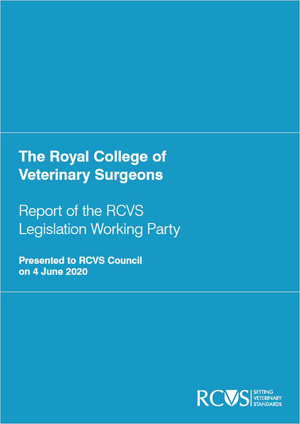 Download the Report of the Legislation Working Party (LWP) which contains a series of wide-ranging recommendations for future reform, such as underpinning the ‘vet-led team’, creating a new ‘Fitness to Practice’ disciplinary system, and a framework for the regulation of veterinary practices.
Download the Report of the Legislation Working Party (LWP) which contains a series of wide-ranging recommendations for future reform, such as underpinning the ‘vet-led team’, creating a new ‘Fitness to Practice’ disciplinary system, and a framework for the regulation of veterinary practices.
Consultation
A consultation on the LWP’s recommendations closed on 23 April 2021, and the results are currently being analysed.
If you would like to find out more about these proposals, please visit our legislation review page for further information.
Under Care and 24/7 out of hours emergency cover
Despite a number of delays due to the pandemic, our review of 'under care' and out-of-hours emergency cover continue.
The survey to all veterinary surgeons and veterinary nurses, along with stakeholder organisations and the animal-owning public has now been completed and the results are being analysed.
Schedule 3
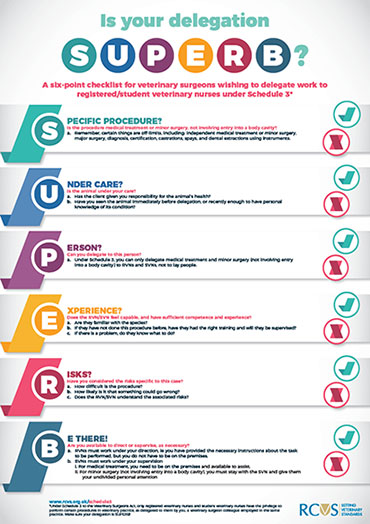 Veterinary Surgeons Act 1966 (Schedule 3 Amendment) Order 2002 (‘Schedule 3’), provides that vets may direct registered or student veterinary nurses who they employ to carry out limited veterinary surgery.
Veterinary Surgeons Act 1966 (Schedule 3 Amendment) Order 2002 (‘Schedule 3’), provides that vets may direct registered or student veterinary nurses who they employ to carry out limited veterinary surgery.
Schedule 3 tasks
- We do not have a list of tasks/procedures that can be delegated under Schedule 3, however Chapter 18 of the supporting guidance, covers delegation of veterinary nurses and provides guidance on the maintenance and monitoring of anaesthesia (paragraph 18.9), vaccination of companion animals (18.10 – 18.12) and dentistry (paragraph 18.13 – 18.14).
In order to assist vets when considering delegating tasks to veterinary nurses, we produced a ‘SUPERB’ checklist poster last year, which sets out a six-point checklist of the key things vets should consider.
Unqualified people
Whilst practices employ staff who aren’t vets or nurses, regardless of their training these people should be regarded as unqualified or laypeople and their job title should not mislead and should reflect their difference from qualified members of staff.
Further guidance can be found in Chapter 19 of the supporting guidance
Changes to the prescribing Cascade
Changes were made to the prescribing Cascade from 1 January 2021, to distinguish between veterinary surgeons practising in Great Britain and those practising in Northern Ireland.
As ever, in the first instance a veterinary surgeon should prescribe a medicine authorised in the jurisdiction where they are practising, for use in the target species, for the condition being treated, and used at the manufacturer's recommended dosage.
Where there is no such medicine available, the veterinary surgeon responsible for treating the animal(s) may, in particular to avoid unacceptable suffering, treat the animal(s) in accordance with the Cascade.
The VMD explainer can be found on the gov.uk website, and in the updated Chapter 4 of the supporting guidance to the Code of Professional Conduct.
New guidance for delegating veterinary work to musculoskeletal therapists
The RCVS Standards Committee approved new guidance in November 2020 to give greater clarity to veterinary surgeons who work with musculoskeletal therapists (MSKs).
The new guidance, found in Chapter 19 of the supporting guidance to the Code of Professional Conduct, sets out the existing rules for musculoskeletal treatment of illness, disease or pathology, and clarifies that healthy animals do not require a veterinary referral for maintenance care.
The guidance stresses that MSKs are part of the vet-led team, and that any animal, including healthy ones, should be registered with a veterinary surgeon and referred to a vet at the first sign of any symptoms that may suggest underlying health issues.
New guidance on microchip scanning of dogs ahead of euthanasia
In May 2021 the RCVS Standards Committee approved new guidance for the veterinary profession for situations when they are presented with a dog for euthanasia and, in the clinical/professional judgment of the veterinary surgeon, the euthanasia is not necessary. It was agreed that, in such circumstances, for example where there are no health or welfare reasons for the dog to be euthanised, that before carrying out the request for euthanasia, the veterinary surgeon should scan the dog for a microchip and check the relevant database if a microchip is found.
The new guidance, found in Chapter 8 and Chapter 29 of the supporting guidance to the Code of Professional Conduct, explains that clients may have a contract with the shelter from which they acquired the dog such that it can be returned to that shelter, and that it may be appropriate to discuss this with them prior to euthanasia. Alternatively, there may be another individual willing to take responsibility for the dog (who may be named on the microchip database), and this may also be discussed with the client.

VN Futures
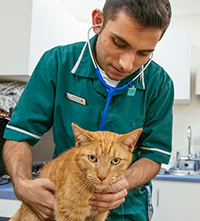 VN Futures is an ongoing project that aims to ensure that veterinary nursing is a vibrant, rewarding, and sustainable profession – now and into the future.
VN Futures is an ongoing project that aims to ensure that veterinary nursing is a vibrant, rewarding, and sustainable profession – now and into the future.
The project seeks to address the challenges veterinary nursing is likely to face over the coming years – tackling how best to respond to these issues, whilst looking forward to a dynamic VN profession through exploring the opportunities.
The VN Futures is a joint initiative from the Royal College of Veterinary Surgeons (RCVS) and the British Veterinary Nursing Association (BVNA).
To find out more about VN Futures, please visit the VN Futures website.
The VN Futures Interim Report
The VN Futures Project will update the profession on its work over the preceding five years, in its interim report, due to be published at the end of September.
The project will also celebrate its first phase and the move into phase two, during BVNA Congress in October, which will include two discussion forum sessions to which all delegates are invited.
School Ambassadors Development Group
Our School Ambassadors work aims to inspire the next generation of veterinary nurses and addresses the need to highlight and support pathways into the veterinary nursing profession through delivering careers advice and information about veterinary nursing to school age children
The work of the School Ambassadors Development Group aims to create approaches to delivery of veterinary nursing careers information, including the need to support widening participation to facilitate increasing diversity in our profession. Our ultimate goal is to create a support pack to enable future ambassadors to continue this important work.
If you are interested in this project, then please contact us with any questions.
Diversity and Inclusion
There are so many important reasons to diversify our workforce. We must reflect the communities we live and work in. We must be an example to young people who often cannot see themselves doing this work because there are not enough role models from diverse backgrounds for them to look to. Incorporating as many different backgrounds, experiences and perspectives into the profession can only benefit the team, pet owners and animal welfare. These aims are reflected in the recently published RCVS Diversity & Inclusion Strategy.
Could you or one of your team members be a role model for diversity in veterinary nursing?
The RCVS and BVNA will be collaborating to address VN Diversity and Inclusion over the coming months, through formation of a dedicated working group.
Student veterinary nurse wellbeing
In June, the RCVS Mind Matters Initiative (MMI) launched a survey to help inform its future work with the veterinary nursing profession.
The survey is specifically aimed at student and newly-qualified (in the last two years) veterinary nurses, as well as the clinical coaches responsible for their practical training at RCVS-approved training practices (TPs), and you can access the survey here.
BVNA Chronic Illness Campaign
The BVNA have recently launched a campaign to raise awareness about chronic illness and conditions among VNs, led by BVNA Junior Vice-President, Alex Taylor. The Chronic Illness Campaign (CIC) aims to create a better working environment for, and better understanding of the challenges faced by, veterinary nurses who suffer from a chronic illness or condition. You can find out more about the CIC and some of the resources available here.
Certificate in Advanced Veterinary Nursing (CertAVN)
The framework for the CertAVN was developed through a VN Futures Working Group in 2019, when the first institutions began delivery of modules.
The CertAVN qualification aims to encourage registered veterinary nurses who wish to take their education in a specific area of veterinary nursing practice further, with an opportunity to study a level 6 or 7 qualification. This provides veterinary nurses with an opportunity to progress to the next stage of their career and to integrate advanced skills into everyday nursing practice. You can find out more about the CertAVN, and the modules currently on offer through four institutions, here.
Career case studies
A career in veterinary nursing uncovers many diverse opportunities and can offer pathways in many aspects of animal healthcare and welfare, from primary care nursing practice to supervisory and management roles, teaching and mentoring and practice development. Supporting nurses’ career development is an important factor in providing role satisfaction and promoting retention of nurses in the profession.
Read our new case studies from veterinary nurses in a variety of different roles, and from a wide range of backgrounds and educational pathways. We are always looking for further case studies to share, so please contact us if you can help.
Maximising potential
The VN Futures project aims to address some of the challenging issues in veterinary nursing and identify and exploit opportunities to progress the profession.
‘Maximising nurses’ potential’, one of the six key ambitions of the VN Futures Report and Action Plan, is a hugely diverse topic, which covers many aspects of the veterinary nursing profession and also needs input and ‘buy-in’ from the wider veterinary team.
This ambition encompasses and interlinks with many other aims of the VN Futures project, for example, to provide ‘structured and rewarding career paths’ for veterinary nurses. The project has approached this ambition through a variety of streams of work, and a selection of these are highlighted on the VN Futures website.
VN Futures webinars
Over the course of 2020, VN Futures delivered a series of three webinars addressing issues around recognition of the value of veterinary nurses’ work, including maximising the potential of veterinary nurses and leadership opportunities within the profession.
We would encourage nurses, vets, practice managers and practice owners/directors to register to watch these webinars via the Webinar Vet website, as they address topics that will influence and benefit the whole practice team.
Leadership (VN) Championship videos
In 2019 the RCVS launched the Inspiring Veterinary Leaders Campaign showcasing some of the veterinary leaders of today and tomorrow Inspiring Veterinary Leaders in the profession.
Hear from three inspiring VN leaders by watching their Leadership stories now.
CPD Buddies
Can you help support your colleagues in practice by being their ‘go-to’ person with CPD questions? If so, maybe you could become a CPD Buddy.
Overseas veterinary nurses
Are you one of the many veterinary nurses who qualified overseas but would like a career as a veterinary nurse in the UK?v
Maybe you are a manager who wishes to support the transition of overseas nurses into the profession?
Only veterinary nurses registered with the RCVS can be delegated to administer medical treatment and perform minor surgery in the UK. This means that if you are interested in working in the UK you must apply to register. The RCVS welcomes applications from veterinary nurses from all over the world. The application process differs depending on which country you qualified in and the qualification you hold.
The RCVS have created a new online course entitled ‘Introduction to the UK veterinary professions – online CPD course for vets and VNs’, which is aimed at overseas-qualified veterinary surgeons and veterinary nurses during their first two years working in the UK.
Get involved with VN Futures
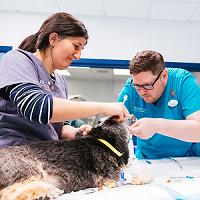 Please visit the VN Futures website where you will find:
Please visit the VN Futures website where you will find:
- More information about VN Futures and our initiatives
- Career case studies
- Information on the Certificate in Advanced Veterinary Nursing
- Links to VN Futures webinars
- Blogs and short articles
Have a say in the future of your profession
The VN Futures project has achieved many positive changes within the profession over the past four years. VN Futures is a two-way process, and we need engagement from the profession to achieve the most from the project.
We are listening, and over the coming months will gather opinion and input on what veterinary nurses feel are the key challenges and opportunities in the profession and generate areas of focus for the next phase of VN Futures. Please look out for opportunities to have your input and ensure your voice is heard.
Contact VN Futures
If you would like to be involved with VN Futures, have an idea, would like to write a blog for us, or would just like to offer some feedback; we would love to hear from you.
Please contact the Jill Macdonald, VN Futures Project Coordinator on [email protected] or 07867 301 723.

Veterinary Nursing Diamond Jubilee
2021 is the Diamond Jubilee for veterinary nursing! This year marks 60 years since the launch of the first RCVS-approved Animal Nursing Auxiliary (ANA) training scheme, a huge milestone for the profession. It’s also the first year that 20,000 veterinary nurses are on the VN Register.
Events
During 2021, a collection of webinars and podcasts have been put together to celebrate how far the profession has come, pay tribute to those who have impacted and influenced veterinary nursing over the years. If you haven’t done so already, please check out the webinars and podcasts we have released so far. There is still fresh content to come including a Diamond Jubilee ebook, so keep an eye out for the latest instalments by following us on Twitter, Facebook, LinkedIn and Instagram.
We’d love you to get involved!
We’d like to invite you to celebrate this incredible milestone with us by sharing a photo that sums up why you love being a RVN. Simply post a photo on Instagram and use our hashtag #VNdiamonds for a chance to be featured in our commemorative e-book that encompasses a brief history of the VN profession. Please remember to ask the owner’s permission if you include any animals in the photo and make sure your profile is public. We look forward to reading your stories and seeing your pictures!

Advancement of the Professions
Welcome to the Advancement of the Professions area. The AP Directorate and Committee are committed to delivery of work that is non-statutory in nature, and contributes to the advancement of the veterinary and veterinary nursing professions. This means that a broad range of topics are covered such as mental health (MMI), Diversity & Inclusion, Innovation (ViVet), Sustainability, Leadership, the RCVS Fellowship, and others. Our aim is to bring these workstreams together where possible to collaborate and to provide both strategic and operational outputs where appropriate. Our new Diversity & Inclusion strategy is below, along with information on ViVet, Leadership and MMI.
Mind Matters Initiative
The Mind Matters Initiative (MMI) aims to improve the mental health and wellbeing of those in the veterinary team, including students, veterinary nurses, veterinary surgeons and practice managers. MMI was launched in 2015 and is funded and run by the RCVS.
Our work is divided into three streams of activity: Prevent, Protect and Support. Below is an overview of our activities in each of the three workstreams. For more information on these, or to find out what else we are working on, check out the MMI website.
Prevent:
Through our Prevent stream, we are proactively looking at systemic issues within the veterinary profession to help minimise the chance of people becoming unwell. Our anti-stigma activities, student support and research-focused activities also fall under the Prevent stream.
- Our &me anti stigma campaign
- Sarah Brown Mental Health Research Grants
- MMI funded research into racism in the veterinary sector
- 2021 Veterinary Mental Health Research Symposium
- Invitation to tender opened for new MMI Training Programme
- Mind Matters International
- MMI funded research into student and newly-qualified VN mental health
- Student Veterinary Nursing Wellbeing Discussion Forum
Protect:
A programme of communications and training designed to equip individuals with the skills and knowledge they need to stay well, even when working under challenging conditions.
- MMI Kite App
- MMI Summer Webinar Series
- Practice Stars Awards
- Emotional Resilience Workshops
- Mental Health Awareness Week Nature Competition
- Animation developed in collaboration with BEVA: Wellbeing for Equine Vets
- Veterinary Schwartz Round Pilot
- Campfire Chats
- Championing Equality Training Courses
Support
Financial and other support for existing independent services, such as Vet Support NI, Vetlife Helpline and Vetlife Health Support, together with an investigation into what more may be required to support those in need, and catalysing the development of those services.
2020 was the busiest year on record for the charity Vetlife, and to help finance the uplift in demand, the RCVS Mind Matters Initiative has provided additional funding to the Vetlife Health Support service.
RCVS Leadership Initiative
Inspired by the Vet Futures and VN Futures projects, the RCVS Leadership initiative seeks to meet our strategic ambition ‘to become a Royal College with leadership… at its heart, and support this creatively and with determination.’
The initiative is focused around three areas of work:
1. Leadership for everyone
Promoting the importance of self-reflection and the development of leadership skills as key aspects of veterinary professionals’ continuing education and providing the resources to help support such development.
2. Leading the profession
Ensuring that, as an organisation, the RCVS is an exemplar of leadership development and is fit to lead the professions.
3. Tomorrow's leaders
Highlighting the diverse range of leadership development opportunities for veterinary surgeons and veterinary nurses, the roles and positions these could lead to, and the impact they could have on the future of the professions.
To learn more about RCVS Leadership and the work we will undertake to meet the initiatives aims, please take a look at the RCVS Leadership Three-Year Plan.
Edward Jenner Veterinary Leadership Programme
On 13 November 2018, as part of our Leadership Initiative, we launched the Edward Jenner Veterinary Leadership Programme - a free-to-access MOOC (Massive Open Online Course) for veterinary surgeons and veterinary nurses.
More information about the programme is available to view and you can sign up for more information.
Inspiring Veterinary Leaders
At Royal College Day 2019 we launched a showcase of diverse roles and experience highlighting some of the veterinary leaders of today and tomorrow.
The Inspiring Veterinary Leaders campaign takes a look at 12 veterinary professionals and their different leadership journeys, each of which can be viewed from our dedicated showcase page.
Leadership Library
The Leadership Library is a new initiative designed to support the RCVS’s strategic aim to:
“Promote the importance of self-reflection and the development of leadership skills as key aspects of veterinary professionals continuing education and to provide the resources to help support such development.”
The Library will provide a bank of curated learning resources on leadership topics that reflect current issues relevant to veterinary professionals. It will cover a range of introductory level content for those looking to develop their everyday Leadership skills and knowledge, before embarking on formal learning programmes, as well a means of refreshing practice for those with more experience. The free resources will be available on the RCVS website, in a variety of different formats, such as presentations, interviews, video clips, blogs, articles and webinars.
We are currently in the process of developing material for the Library in collaboration with leadership experts. It is anticipated that content will start to be released on the RCVS website in the latter part of November 2021. The Library will continue to grow an evolve with new content added regularly.
Find out more: request to join our mailing list by contacting [email protected]
Fellowship
The RCVS Fellowship aims to advance Veterinary standards by providing a resource of independent knowledge for the benefit of the Veterinary Professions.
Specifically, the RCVS Fellowship seeks to fulfil this aim by creating a thriving learned society. Its prestige is built upon its ability to attract veterinary surgeons whose activities demonstrate excellence across the entire veterinary landscape and who have distinguished themselves on account of their ongoing commitment to using their experience and knowledge to enhance the profession further.
The Fellowship, therefore, offers a platform to make this contribution within and assisted by the RCVS structures and governance framework.
Since 2016, the RCVS Fellowship has been awarded in recognition of outstanding contributions to the veterinary profession with applications judged on:
- Meritorious Contributions to Knowledge (MCK);
- Meritorious Contributions to Clinical Practice (MCCP); or
- Meritorious Contributions to the Profession (MCP)
By offering these three broad routes to Fellowship it should be possible to become a Fellow irrespective of professional background, specialism or interest.
The Fellowship, therefore, offers a platform to make this contribution within and assisted by the RCVS structures and governance framework.
This year, the Fellowship have updated their application process as part of the Fellowship’s aims to become more diverse and inclusive. These measures are expected to reduce the effect of unconscious bias during the assessment process. Applicants will now need two signed referee forms instead of three professional references and five assessors will review each application instead of three.
Fellowship Week:
Our annual Fellowship event took place from 30 September – 7 October 2021, showcasing the variety and extent of the Fellowship’s knowledge-base, with RCVS Fellows presenting their research, as well as recognising those who have been newly-awarded their Fellowship in 2021.
The event also hosted a student research competition where current students and newly qualified veterinary surgeons presented their original research to a judging panel of Fellows.
The event is accessible from our Fellowship pages on our website.
ViVet: The Network for Veterinary Innovation
ViVet is a wide-ranging programme to support veterinary professionals to engage with innovation and to encourage innovators to engage with the veterinary professions when launching new products or services. In doing so it seeks to put veterinary professionals at the centre of innovation in the animal health sector.
The programme showcases new technologies and businesses, and provides practical advice on launching new products and services, through online resources and events. Under the programme regulatory advice and guidance will be made available to help veterinary professionals working at the forefront of innovation or those from outside the profession seeking to bring new products or services to the veterinary or animal health market.
The programme will help us to gain insights into the market and how it is evolving, allowing us to develop a regulatory framework that is adaptable to 21st century technology, fostering and supporting innovation, whilst at the same protecting animal health and welfare.
Podcasts: Innovation in the workplace
Developed as part of our ViVet initiative, designed to ensure veterinary professionals are at the centre of innovation in the animal health sector.
The full series is available - we hope you enjoy them and find them helpful. They can of course be counted towards your CPD targets if they align with your objectives for the year.
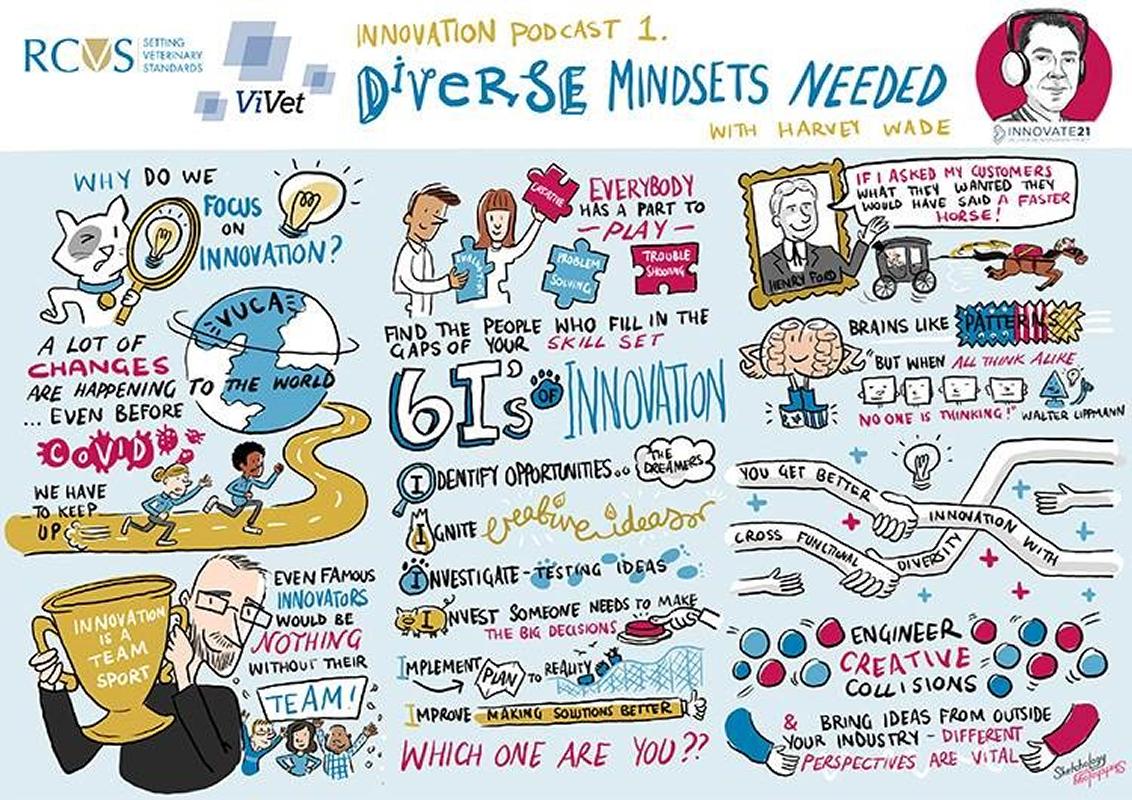
Blogs
Reports: ViVet Innovation Symposium
Our biennial Innovation Symposium, bringing together veterinary professionals and stakeholders from diverse backgrounds to discuss the evolving role of the veterinary professions and the advancements in both companion and production animal care in the UK and across the world.
The full reports and session recordings from the day are available to view.
Keynote - Survival in the New Normal: the Impact of Digitisation on Customer Behaviour
Keynote speaker Nancy Rademaker, a partner in nexxworks, a digital consultancy, began her address with a question: “Do you know this object?” she asked the audience, showing them a picture of an old-fashioned rotary dial telephone. Every member of the audience agreed that, yes, they did know what the object was. She then asked: “Do you know how to operate this object?” When every member of the audience agreed that they knew how to operate the telephone, she said: “So all of us are ‘old normal’.”
Contact ViVet
If you would like to be involved with ViVet and have an idea, would like to showcase your innovation, provide a case study, or would like to engage with veterinary professionals working at the forefront of innovation; we would love to hear from you.
Please contact Sophie Rogers, ViVet Manager [email protected]
Diversity and Inclusion
Diversity & Inclusion Working Group (DIG)
Chaired by Dr Niall Connell MRCVS, our Diversity and Inclusion Working Group (DIG) aims to break down barriers with regards to selection, recruitment and retention to encourage more diversity within the professions – including, but not limited to, ethnic, socio-economic and sexual orientation diversity.
Diversity and Inclusion Group Strategy
We launched our Diversity & Inclusion Group (DIG) Strategy on 17 February 2021, setting out how we will work to help create veterinary professions where everyone can flourish and which have no place for discrimination.
Read the Diversity and Inclusion Group Strategy.
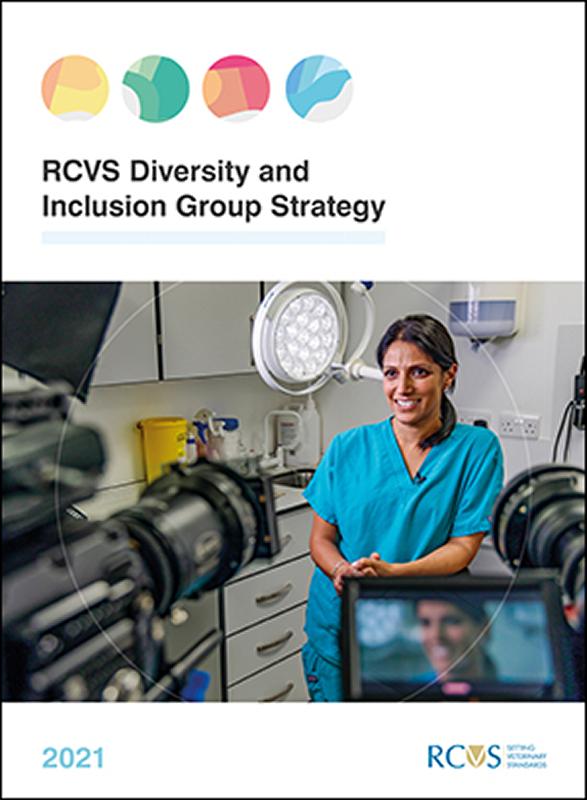

Information for vets coming from overseas
Registering in the UK
Working as a veterinary surgeon in the UK
Only veterinary surgeons registered with us can practise veterinary medicine in the UK. We also register veterinary nurses and veterinary premises.
RCVS membership licenses you to practise veterinary surgery in the UK; it does not exempt you from UK entry visa or immigration requirements where applicable. Applicants are advised to ascertain these before attempting entry into the UK.
Information and assistance can be obtained from the British Embassy or the UK Home Office. Applicants seeking long-term employment in the UK may need a work permit, which can only be obtained by an employer.
Am I eligible?
As a veterinary surgeon, there are several different routes to registering with the RCVS depending on where you graduated from.
You are eligible to register if you graduated from Australia, South Africa or New Zealand and you have obtained an RCVS Council recognised qualification.
If you graduated from the USA or Canada then your university must have been accredited by the AVMA Council on Education at the time of your graduation your scores for the NBE/CCT or NAVLE must meet RCVS requirements (for tests taken after 1992 you must have achieved a score of 425 or over, for tests taken before 1992, your score must be no more than 1 standard deviation below the mean). If you meet this criteria then you are eligible to register.
You are all also eligible to register if you graduated in Europe and your university was approved or accredited at the time that you gained your qualification. Check whether your university is eligible.
Please note: you must also be able to demonstrate that you can communicate in English at an appropriate level. This can be demonstrated by taking either the International Language Testing System (IELTS) or the veterinary version of the Occupational English Test (OET).
For more information and to check whether your qualification makes you eligible to register as a member of the RCVS please visit the RCVS our regstration applications page.
How do I register?
All applicants must provide documents relating to identification, qualifications and a letter of good standing. Where relevant an English test certificate will also be required. The registration process takes 20 days from receiving all your documents.
Please note: Some countries may be asked to provide some additional supporting documents.
All applicants will need to pay a registration fee, complete an application form and attend a registration appointment.
Please note: due to the pandemic, we are currently carrying out video appointments via Microsoft Teams, although in normal circumstances we would invite applicants to the RCVS office in London for a face-to-face appointment.
For more information, you may contact the Registration team via [email protected] or 020 7202 0707.
Statutory Membership Examination
The RCVS Statutory Examination for Membership takes place once per year.
The first component is a multiple-choice-question test which is held in late April/early May. This paper is delivered remotely, meaning that you may attempt it using your own computer, from a suitable location of your choosing.
Candidates who pass the written component will take the practical OSCE component at the University of Glasgow School of Veterinary Medicine in July.
If you are interested in taking the exam, you can begin this process at any time by submitting a declaration of intention to sit. Please see our examination webpage for the required forms and the examination guidance document.
Introduction to the UK Veterinary Professions online course
The ‘Introduction to the UK veterinary profession – online CPD course for overseas vets and VNs’ is run by the Royal College of Veterinary Surgeons (RCVS) and VDS Training.
This two-part online course is aimed at overseas-qualified veterinary surgeons and veterinary nurses during their first two years working in the UK, as well as those considering working here. It will help to equip you with the vital knowledge and insight needed to work as a veterinary professional in UK veterinary practice.
You will hear from representatives of the RCVS, VDS Training, Veterinary Nurses Council, British Veterinary Association, VetAbroad and the charity Vetlife, and have the chance to ask questions.
Course format
The course is divided into two parts as follows:
1. Online pre-recorded talks and a live Question & Answer session (both free of charge)
2. Online live communications skills training session (£150 + VAT)
You do not have to complete both parts of the course, but may choose what is suitable for you.
The communications skill training in part 2 is a practical and participatory part of the course which is run by VDS Training.
To find out more information about the course including dates for 2021 and how to register, please visit our Introduction to the UK Veterinary Professions page.
 Practice Standards Scheme
Practice Standards Scheme
The Practice Standards Scheme (PSS) is a voluntary initiative to accredit veterinary practices in the UK and over two-thirds if the UK practice premises are part of the Scheme. Through setting standards and carrying out regular assessments, the Scheme aims to promote and maintain the highest standards of veterinary care.
In this section you will find key information about the Scheme.
Not yet RCVS-accredited?
Are you considering whether the Practice Standards Scheme is right for your practice, or would like to find out more? Visit our webpage on RCVS accreditation or information on the different levels of accreditation you can apply foir, as well as a step-by-step guide to support you through the application process.
Already accredited?
In this section you will be able to find helpful information and resources to help your practice operate within the Practice Standards Scheme.
Practice Standards Awards
Applications open for assessment from November 2021 onwards.
Once your practice premises has achieved accreditation you may apply for optional Awards in specific areas, to denote where your practice excels. Find out about the awards you can apply for, as well as a step-by-step guide to awards assessment.
In-person assessments re-starting in October
Following a period of virtual assessments due to the pandemic, we’re pleased to let you know that we began in-person assessments again from October. You may find it useful to read our ‘What happens during an assessment’ guide which includes step-by-step information about how to prepare and what to expect during the assessment.
Our up to date Frequently Asked Questions page is available to answer queries you might have.
RVNs now eligible to become PSS Assessors
Earlier this year, RCVS Council approved a pathway for RVNs with a minimum of five years’ experience within the profession to be eligible to apply to become PSS Assessors. Find out more about becoming a PSS Assessor.
Helpful information and resources
If you are looking for ways to promote your accreditation, please visit our resources section to help you promote your RCVS-accreditation to your clients.
PSS Sustainabilty Project
The RCVS Practice Standards Scheme (PSS) unveiled its landmark sustainability project in October 2021. The project was announced at an introductory workshop with veterinary stakeholders from across the profession, including representatives from veterinary practices and the Major Employers Group (MEG).
The project will introduce sustainability standards into the PSS accreditation standards that all practices who are signed up to the PSS scheme will need to meet. Over two-thirds of UK practices are currently signed up to the PSS, so this is a unique opportunity to impact the long-term sustainability of the veterinary profession.
If you want to find out more about the Practice Standards Scheme and the new sustainability policy, you can contact them on at [email protected] or by calling 020 7202 0767.

Contact us
The following teams will be available to speak to throughout the Congress, so you can get in touch with them directly:
Advancement of the Professions team
Alternatively, you can submit your query by completing this form.
